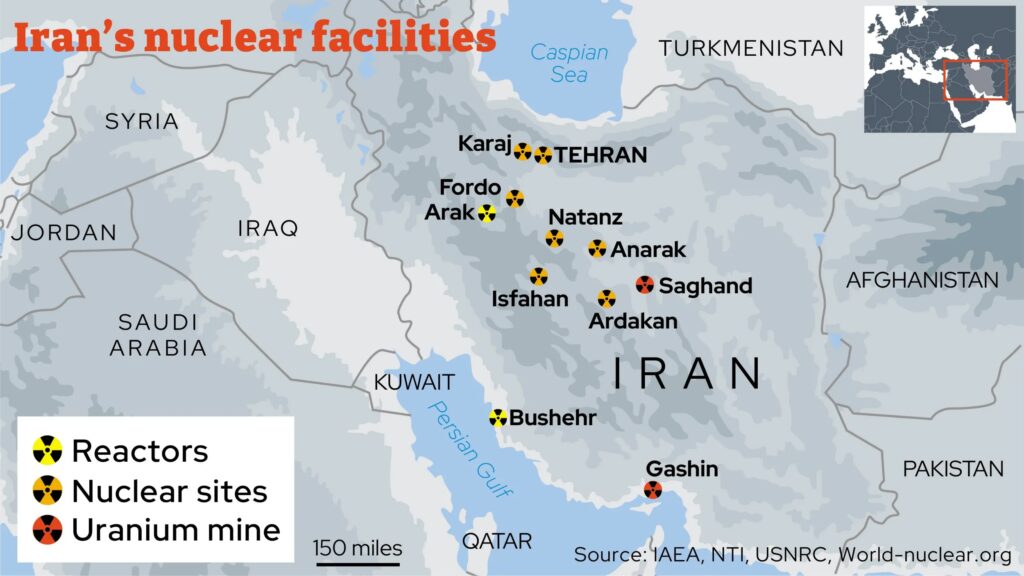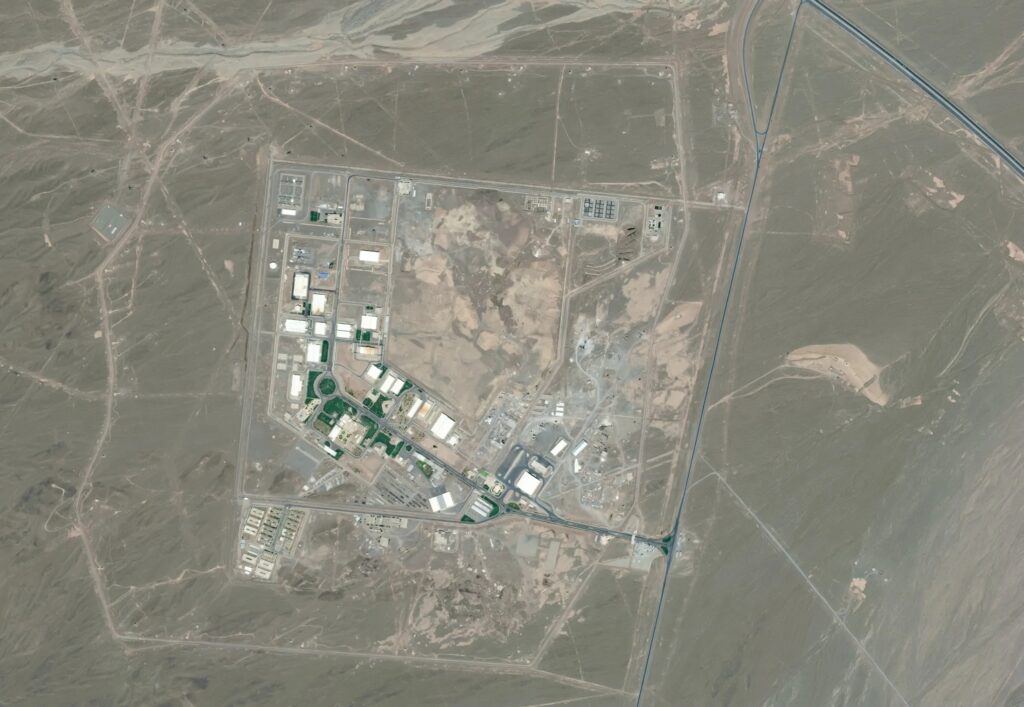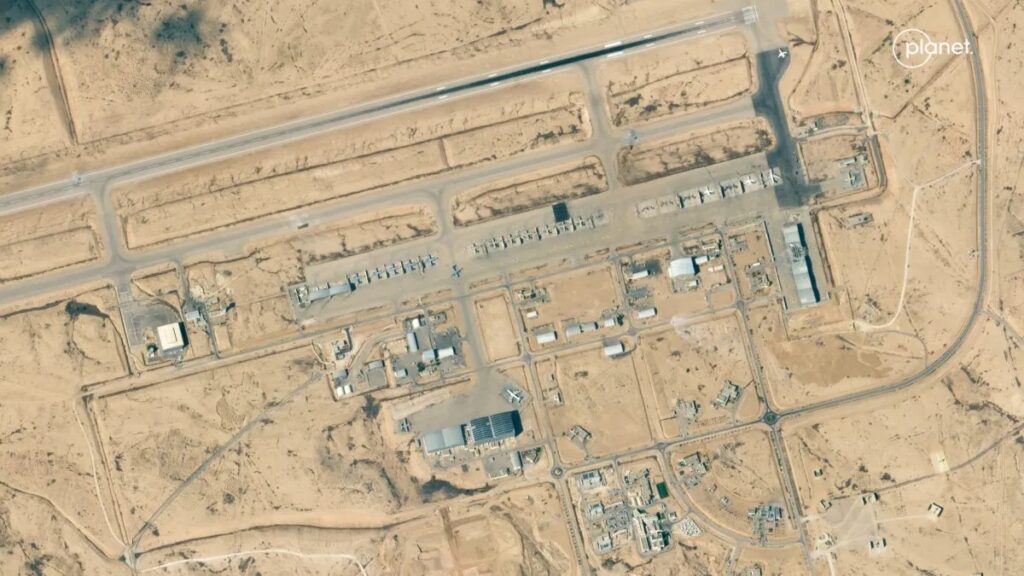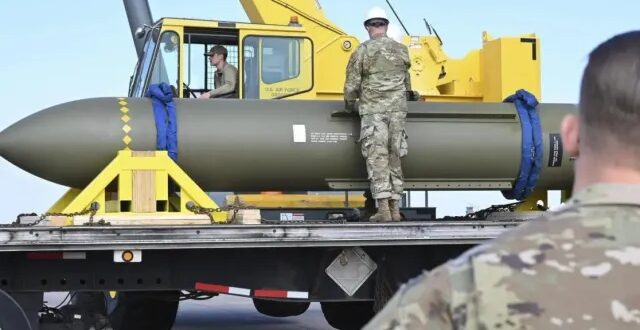AnalysisMilitary analysts suggest the only bomb capable of piercing Iran’s targets would be the US-made GBU-57A/B Massive Ordnance Penetrator
Israel lacks the capabilities to inflict major damage on Iran’s nuclear sites alone, but an escalation of the conflict could lead to US participation in attacks on Iran, analysts believe.
Israeli officials have threatened to strike Tehran’s nuclear assets in the aftermath of Iran’s unprecedented missile attack on Israel last week, with oil facilities and military targets also said to be under consideration.
“There will be no better time to strike Iran’s nuclear programme and regime,” said former prime minister, Naftali Bennett, on Tuesday, claiming Israel has the justification to do so following the missile attack, and greater freedom to strike with Iran’s allies Hamas and Hezbollah weakened.
But military specialists believe Iran’s heavily fortified network of nuclear facilities would challenge Israel’s capabilities.
An assessment from the Bulletin of the Atomic Scientists, a US journal covering nuclear issues, stated: “The Iranian nuclear complex is too dispersed, key facilities too hardened, and nuclear expertise too consolidated to be eliminated through limited military strikes.”
An Israeli attack would also risk prompting Iran to accelerate towards a nuclear bomb, the authors added, and to pursue this goal in “dispersed and undisclosed locations, making military targeting very challenging”.
While Iran is considered a nuclear threshold state, with the potential to produce a bomb within a year, according to a recent US assessment the regime has not yet moved to weaponise its nuclear programme.
Michael Mulroy, a former senior US Defence Department official and security analyst, believes Israel would need US assistance to do significant damage to key sites such as the underground enrichment plant in Fordow.

“It is likely that to be effective the US would need to participate. The specific aircraft, munitions and ability to suppress air defences would be necessary,” he said.
Military analysts suggest the only bomb capable of piercing Iran’s hardened targets would be the US-made GBU-57A/B Massive Ordnance Penetrator (MOP), a 14-tonne “bunker buster” capable of penetrating to a 60-metre depth before detonating a 2.5-tonne warhead.
“They are needed,” said Mr Mulroy, adding that Israel is not known to possess the bomb.
Dr Ken Katzman, a former CIA official, now at the Soufan Centre think-tank, agreed the US’s most powerful munitions would be necessary.
“The Fordow site, where they do their most advanced uranium enrichment, is a buried site that’s partially embedded in a mountain,” he said. “To destroy the site the way you need to, you probably need munitions that only the US has and has not given to Israel. The very heaviest, the most effective bunker busters.”
Israel would also face complications such as the flight distance of about 1,000km to Iran, even if the US supplied the bombs.
“To carry heavy bombs that far, is a little bit of a task for Israel,” he said. “The heavier the munitions, the less the range of the delivery aircraft. So there’s a problem of how long they can be over Iran to really destroy these targets.”

Israel would also have to negotiate with the Gulf states en route to Iran to allow use of their airspace. Tehran has warned Gulf states it would be “unacceptable” if they allowed use of their airspace or military bases against Iran.
The US would not face the same issues, however.
“The US has [aircraft] carriers and bases right in the Gulf, very short flight to get to Iran, so the US can stay over Iran much, much longer than Israel can, with many more aircraft and much heavier munitions,” said Dr Katzman.
Washington would be unlikely to countenance a “bombing run” as part of an initial Israeli attack, but that calculation could change depending on Iran’s retaliation, Dr Katzman believes. Tehran has threatened a “more powerful” response to any Israeli attack, with analysts speculating that this could include strikes against oil facilities in US-aligned Gulf states.
Such an attack could lead to US involvement in a “full war”, he said.
Mr Mulroy also believes US strikes against Iran would be contingent on the Islamic Republic’s response, suggesting this could be triggered either by an attempted breakout to a nuclear weapon, or if an Iranian attack “causes significant damage or death in Israel”.

An Iranian retaliation would be determined by the scope and targets of an Israeli attack, said Dr Hamidreza Azizi, an Iran foreign policy specialist at the German Institute for International and Security Affairs.
Tehran could probably absorb a limited attack on military targets but would be likely to follow through on threats of a major retaliation that could risk civilian casualties if Israel strikes nuclear or oil sites, he believes.
“If Israel goes for infrastructure, be it energy or nuclear, Iran’s response would be also bigger,” he said, noting that hawks in Iran were encouraged that the recent missile salvo succeeded in piercing Israeli air defences and striking targets such as the Nevatim air base.
“Iranian officials have been manoeuvring on that – next time the targets won’t be military sites, the targets would be in kind, for example infrastructure and social centres.”
Israel’s Prime Minister, Benjamin Netanyahu, has often described Iran as an existential threat throughout his political career. The Israeli leader reportedly came close to ordering strikes against its nuclear facilities in 2012, and pressed the Obama administration to take part.
Dr Yossi Mekelberg, a Middle East analyst and expert on Israeli politics, told i that it would be Mr Netanyahu’s “preferred option” to involve the US in a conflict with Iran and “do the job of eliminating its nuclear programme”.
Iran’s nuclear sites are “Israel’s ultimate goal”, he added.
While President Joe Biden has publicly discouraged Israel from an escalatory attack on Iran’s nuclear or oil sites, the US has also backed Israeli actions such as the ground offensive in Lebanon after counselling caution.
Mr Netanyahu could yet succeed in drawing the US into a conflict with Iran, Dr Mekelberg believes.
“We are entering into the unknown and unpredictable. The US might not want to get embroiled in such a scenario, but events might be pulled into it,” he said.
 Eurasia Press & News
Eurasia Press & News


